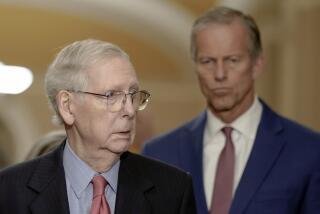Editorial: Working with President Trump
In graciously conceding to Republican Donald Trump on Wednesday morning, Hillary Clinton told her supporters, “We owe him an open mind and a chance to lead.”
The question is, lead where? Unlike Clinton’s campaign, which churned out policy proposals with the frequency of grocery store coupons, Trump — who has no political or governmental experience whatsoever — showed little interest in the details of his agenda. Instead, it was all about the top line: building the “best wall” along the southern border, replacing Obamacare with “something great,” overhauling our “horrible” trade deals, putting U.S. interests first and making the country great again.
More than half of the nation’s voters rejected that vague and simplistic pitch; nevertheless, they will soon have to contend with a President Trump armed with a GOP-controlled Congress. The temptation will be enormous among Trump critics to be rejectionist — to adopt the approach that the Senate’s top Republican, Mitch McConnell, took after Barack Obama was elected president in 2008: reflexive, unyielding opposition in the hope of making Trump a one-term president. But the obstructionism of McConnell and his GOP colleagues has left Washington practically inert for six years on seemingly all of the major problems facing the country.
If Clinton — whom Trump did not just vilify, but pledged to pursue with a special prosecutor if he were elected — can rise above the bitterness and disappointment of the moment, shouldn’t those who voted for her? The challenge of the months ahead for those of us who are alarmed by Trump’s agenda will be to figure out how to keep the country moving forward, how to minimize polarization in order to make progress on whatever common goals can be identified — while at the same time sticking fiercely to core principles and fighting back against Trump’s most outrageous, bigoted, unfair or unjust proposals.
The question of when to stand firm and when to cut deals is one of the oldest moral and tactical questions in politics. Negotiating pragmatic bargains with one’s opponents is at the heart of the American system. But before making significant trade-offs, Americans (and their elected representatives) have to ask themselves whether they’re betraying core principles on which there should be no compromise, such as protecting humanity against the threat of climate change, eradicating discrimination, and giving all Americans an opportunity to prosper. If it’s merely a matter of short-term interests, then the question is whether the proposed compromise, even if flawed, is an improvement on the status quo.
We all can and should agree on many elements of the big picture — the importance of a growing economy that lifts all segments of society, the need to help the poorest Americans climb out of poverty, the absolute necessity of preserving the environment and human health. The fight will be over how to achieve them.
Trump has sounded a few welcome notes of conciliation since his victory, in sharp contrast to the drumbeat of division he pounded out up to that point. That sentiment will be for naught, however, if he insists on pursuing the unprincipled, dangerous and deeply polarizing ideas he espoused during the campaign.
On Wednesday, President Obama said he’d been encouraged by what he heard from Trump since the campaign ended. He then laid out what he thinks the country needs: “A sense of unity; a sense of inclusion; a respect for our institutions, our way of life, rule of law; and a respect for each other.” If President-elect Trump could agree on the value of those fundamental verities, that would be a starting point for moving forward.
Follow the Opinion section on Twitter @latimesopinion and Facebook
More to Read
A cure for the common opinion
Get thought-provoking perspectives with our weekly newsletter.
You may occasionally receive promotional content from the Los Angeles Times.






